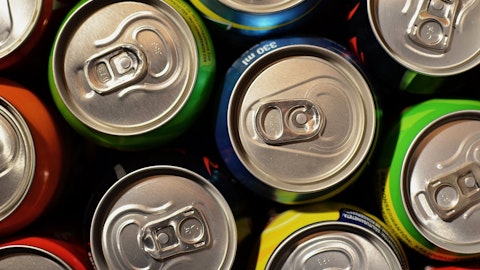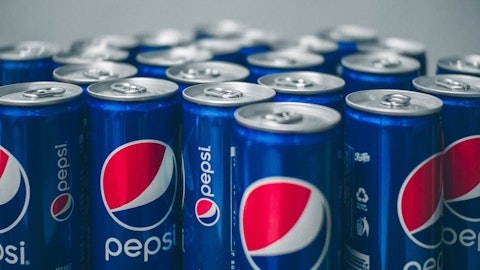Dan Fisher: I don’t know how quickly Leella can start drinking out of cans. That will help to answer the — I think, the downtime question. But, in all seriousness, Scott laid it out really well. So in South America, you are entering in the off-peak season. So you typically do curtail. The balance of this comment about curtail there is curtailment and its maintenance. So it’s plant maintenance. So you are going to have that for certain. And then in North America, our plants performed extraordinarily well in Q1 and volumes were a little down versus our expectation. So we carried in a little bit more inventory in the second quarter and we are going to manage that, we are going to manage that tightly here for the balance of the year for cash-generative purposes.
We have got a lot of flexibility in our lines, as you know. The curtailment question for us is harder to answer. Angela, I think you know this about us, because we have multiple can sizes on every line. There is one can size that certainly has excess capacity, writ large in the North and Central American market. We do have exposure to that, but it’s limited. And so the next question, I think, that you were leaning into is there, depending on what the brand is or the product is that’s innovating and that’s winning, we can flex to that, and we can turn that on. We are in a really healthy position in terms of safety stock and we are in a healthy position in terms of we are performing a heck of a lot better than we have in the last couple of years in running our business.
So if things suddenly shift, we have got dry powder and we have got dry powder in a number of can sizes that gives us flexibility to move into whatever the winning product and whatever the winning brand is going to be. So I am not concerned about us stepping into upside. I — and we are going to manage inventory positions and safety stock levels really with a lot of discipline here in the second quarter.
Scott Morrison: And Angel, just to give more granularity in the prepared comments, I said, in North America, we would essentially be flat sequentially first quarter to second quarter given the downtime of things that we are going to do and getting our inventories right. In South America, the negative will be larger than that. Given the volume, the mix and the absorption, it will be softer than it was in Q1 and then we expect to be in a better position as we move into the busier second half of the year.
Angel Castillo: That’s very helpful. Thank you. And then just maybe following up on the strength in the other segment. I am curious, you talked about corporate, you reiterated the guidance there. Just maybe some of the other pieces, some of the strength you are seeing in aerospace and just what the underlying expectations for that segment will be kind of for the full year?
Dan Fisher: Our aerosol business is doing really well. We continue to win business. We continue to have nice volume growth. That business is seeing — during COVID it was really impacted, I would say, volumes globally and we are seeing that really come back nicely. We are seeing — and new products and innovation is driving a lot of that, both kind of in the typical aerosol personal care space, but also in the water space and the refill and reusable side. And in aerospace, I think, somebody mentioned, we had a choppy year last year. We had supply chain challenges that cost us money. And the business is performing exceptionally well. They are stepping into these newer contracts that we were confident would be good and they are good, and we will see the benefits of that for the full year. So we are really excited about those businesses.
Angel Castillo: Thank you, Dan. Appreciate it.
Operator: Thank you. The next question comes from Cleve Rueckert of UBS. Please go ahead.
Cleve Rueckert: Hey. Good morning. Thanks for taking my questions.
Dan Fisher: Good morning.
Cleve Rueckert: A couple of quick follow-ups from me. I am just curious, just digging into the inventories a little bit. I am just curious where inventories both from a finished product and raw material standpoint, where they stand versus your target, I guess, as of the end of the quarter? And if you were building inventories or if you are starting to work them down at this point?
Dan Fisher: Well, we are working — in North America and in South America, we are working them down. So that’s why you see a big swing in payables. We are not ordering as much metal, both finished goods and coil, raw material. And so we have got another quarter of that to do in Q2 and then we think we will be in a much better position from an inventory standpoint. In Europe, it’s not — we are turning on a couple of plants, so it’s a very different dynamic there. But in North America and South America, it’s about getting our inventories down.
Cleve Rueckert: Right. And is that more on the raw material side? I mean you mentioned coil, is finished product inventories…
Dan Fisher: It’s both. Yeah.
Cleve Rueckert: Yeah.
Dan Fisher: It’s both. I mean and we are talking…
Cleve Rueckert: Okay.
Dan Fisher: In North America we are talking days of finished good inventory. But we — a lot of this — the raw material piece is still a bit of an overhang from last year, because we were bringing in a lot and anticipating growth at this time last year. So we have held on to larger raw material stores and we have been working that off. We are continuing to work that off. And the finished goods, it’s not significantly different than what we anticipated heading into the year. But a few days of additional curtailment is meaningful in a quarter and I think that’s what Scott’s signaling to you.
Cleve Rueckert: Yeah. Yeah. I think that’s very clear. And then just like a quick follow-up. Did you import any cans into North America in the first quarter?
Dan Fisher: No.
Cleve Rueckert: Okay. That’s very clear. And then…
Dan Fisher: Yeah.
Cleve Rueckert: …one last one from me. On the promotional activity…
Dan Fisher: Sorry. Maybe — one — maybe this will help for further Q&A regarding that question. We didn’t last year either. So there was a 21 to 22 bridge at each quarter for that. But we have originated all that production last year and you won’t have any of that commentary. For North America specifically, we did have a little bit of Saudi into Europe last year and that’s now gone away and we have got origination production now in Europe.
Cleve Rueckert: Okay. And then just the last one for me is on promotional activity and I appreciate the conservative tone that you are taking and the plan. But just when do you expect to gain visibility, I mean, is there still at this point in the year, the potential for promotional activity to pick up and have a material impact on volumes?
Dan Fisher: Yes. I mean, absolutely, I mean, promotion works really well for us from a volume perspective. The degree to which the promotion is, I think, is the big question. And we are really not trying to avoid this question. But I think here’s the backdrop that we are facing relative to going into much detail or fully understanding the real impacts of what a promotion would look like and how it would react consistent with kind of historical norms. If you look at a 12-pack of CSD cans, three years ago it was about $4 on average, today it’s $8. So is $1 off going to move it? Is $2 off going to move it? So it’s not just promotion. It’s the elasticity in and around the price of the promotion that is very difficult for us to characterize and I think it’s difficult even for our customers probably to understand.
So at this point, we need to plan to deliver cash and deliver earnings and the end consumer strength or weakness is also something that’s very difficult to understand right now just given the stimulus packages and higher interest rates and all of those things. It’s just — it’s ambiguous and difficult to quantify right now. So we are running for cash and we are managing what’s in front of us and until something changes substantively, I think, that’s the best tone for our corporation and our employees to manage to.
Cleve Rueckert: Yeah. That makes a lot of sense. Good luck with it all. Thank you.
Dan Fisher: Thank you.
Scott Morrison: Thanks.
Operator: Thank you. The next question comes from Anthony Pettinari of Citi. Please go ahead.
Bryan Burgmeier: Good morning. This is actually Bryan Burgmeier filling in…
Dan Fisher: Hi, Bryan.
Bryan Burgmeier: …for Anthony. Thanks for taking the questions.
Dan Fisher: You bet.





